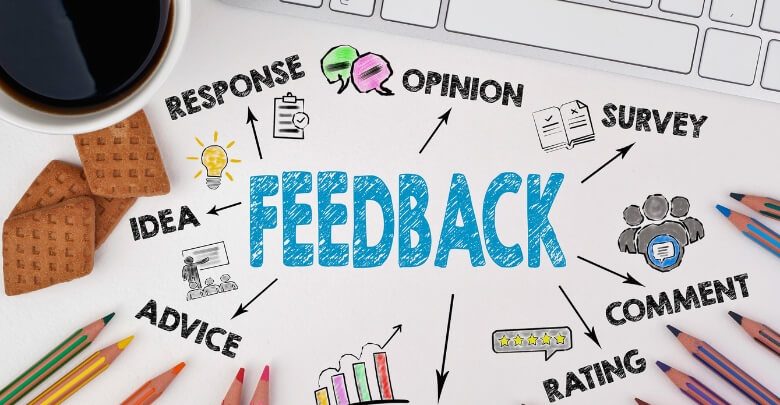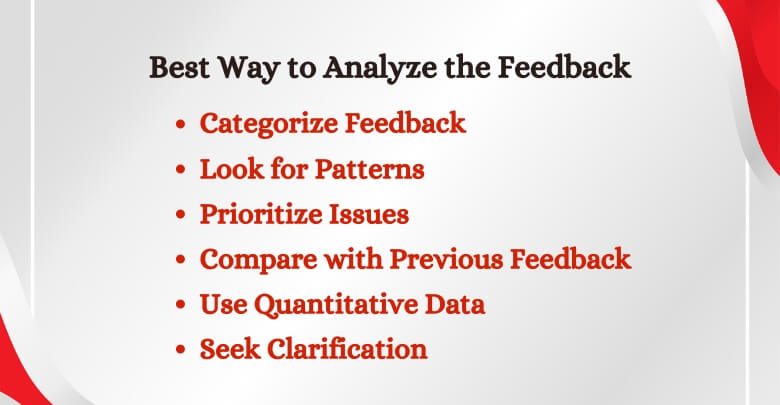Receiving feedback from conference attendees is crucial for understanding what worked and what needs improvement. It helps event organizers enhance future events and meet audience expectations. Moreover, it shows attendees that their opinions matter and motivates them to participate. So how do you ask for feedback after a conference?
Send post-event surveys with specific questions within 24 hours. You can use an anonymous rating scale to encourage honest responses. Focus on improvement by asking attendees what can be enhanced. This method gathers helpful feedback and shows you care about making things better.
Keep reading the article to learn more about collecting and using feedback effectively to improve your future conferences.
Importance of Feedback Following a Conference
Gathering feedback after a conference helps organizers understand the event’s impact and areas needing improvement. Attendees’ opinions highlight what worked well and what didn’t. In that case, taking post conference feedback is crucial for strengthening upcoming conferences and making them more successful. Feedback shows attendees that their voices matter, promoting a sense of involvement.

Collecting feedback promptly ensures responses are fresh and accurate. Using post-event surveys with specific questions within 24 hours is effective. An anonymous rating scale encourages honest and constructive feedback. Asking what can be improved rather than what went wrong is more productive.
Feedback also helps build stronger relationships with attendees. It shows organizers value their input and are committed to improvement. This approach can lead to increased satisfaction and loyalty. Eventually, feedback is a powerful tool for continuous event enhancement.
How Do You Ask for Feedback After a Conference?
Collecting feedback after a conference is crucial for improving future events. The process must be simple and efficient to ensure you get valuable insights. Here is a step-by-step guide to help you ask for feedback effectively.
Step 1: Send Post-Event Surveys Promptly
Distribute surveys within 24 hours of the conference’s end. Prompt responses are more accurate and useful. Timeliness shows attendees their opinions are valued.
Step 2: Use Specific Questions
Write questions that target specific aspects of the conference. This approach ensures detailed and relevant feedback. Avoid vague questions to get precise insights.
Step 3: Include an Anonymous Rating Scale
Incorporate an anonymous rating scale to encourage honesty. Anonymity helps attendees feel comfortable sharing genuine opinions. Honest feedback is essential for improvement.
Step 4: Focus on Improvement
Ask what can be enhanced rather than what went wrong. This positive approach fosters constructive feedback. It helps you identify actionable improvements for future events.
Step 5: Provide Multiple Feedback Channels
Offer various ways for attendees to give feedback, such as online surveys and email. Different options increase response rates. Flexibility accommodates attendees’ preferences.
Step 6: Follow Up with a Thank You
Send a thank-you note to participants who provided feedback. Expressing gratitude reinforces their involvement. It also encourages future feedback participation.
Step 7: Analyze and Act on Feedback
Review the feedback thoroughly and identify key areas for improvement. Implement changes based on attendees’ suggestions. Showing that you act on feedback builds trust and engagement.
Gathering feedback is a continuous process that enhances the quality of future conferences. By following these steps, you ensure comprehensive and constructive feedback. When the participants provide feedback on the conference, it contributes to valuable insights that help create more successful and satisfying events. This method ensures that every aspect of the conference is evaluated and improved upon.
What Questions Should You Ask?
When seeking feedback after a conference, asking the right questions is essential. It ensures international conference organizers get useful insights for future improvements. Asking the right questions will provide the proper answers for writing a post-conference report following standards. Here are key questions to consider, explained with subheadings.
Overall Experience
How was your overall experience at the conference? This question helps gauge attendees’ general satisfaction. It offers a snapshot of the event’s success. Knowing this makes it easier to pinpoint general areas that need improvement.
Session Quality
What did you think about the quality of the sessions? This feedback focuses on content relevance and speaker effectiveness. High-quality sessions are crucial for a successful conference. Identifying strong and weak sessions guides future planning.
Venue and Logistics
Were you satisfied with the venue and logistics? This question addresses the physical aspects of the event. Comfortable venues and smooth logistics enhance the overall experience. Identifying logistical issues helps avoid them in the future.
Networking Opportunities
How were the networking opportunities at the conference? Networking is often a key reason for attending. Evaluating these opportunities helps improve future networking events. Facilitating valuable connections enhances attendee satisfaction.
Suggestions for Improvement
What suggestions do you have for improving future conferences? This question encourages constructive feedback. Attendees often have great ideas for enhancements. Implementing these suggestions shows you value their input.
Asking these questions ensures comprehensive feedback, covering all essential aspects of the conference. This approach helps create better future events and demonstrates a commitment to continuous improvement.
Best Way to Analyze the Feedback for Future Improvements
Analyzing feedback is crucial for making meaningful improvements to future conferences. Properly evaluating the feedback helps identify strengths and areas for development. Here are tips to effectively analyze feedback for future enhancements.
Categorize Feedback
Organize feedback into categories such as logistics, sessions, and networking opportunities. This helps you see common themes and specific issues that attendees experienced. Categorizing feedback simplifies the analysis process, making it easier to identify patterns. It also highlights specific areas that need immediate attention, ensuring targeted improvements.
Look for Patterns
Identify recurring comments and themes within the feedback to understand common attendee experiences. Patterns indicate widespread issues or successful aspects that were noted by many. Addressing common concerns can significantly improve overall attendee satisfaction. Recognizing positive patterns reinforces successful strategies and elements of the conference.
Prioritize Issues
Not all feedback requires immediate action, so it’s important to prioritize issues based on their impact. Focus first on addressing high-impact areas that affect attendee experience the most. This prioritization ensures that the most significant improvements are made promptly. It also helps allocate resources effectively, addressing the most pressing needs.
Compare with Previous Feedback
Review feedback from past events to identify trends and compare them with current feedback. This comparison helps spot ongoing issues or confirm improvements over time. Identifying consistent problems allows for more strategic long-term planning. It also demonstrates progress and areas where past changes have been effective.
Use Quantitative Data
Analyze numerical ratings and scores from surveys to gain clear, measurable insights. Quantitative data provides a concrete basis for identifying specific strengths and weaknesses. Tracking these metrics over time helps in assessing the progress and effectiveness of changes. This data-driven approach ensures a more objective analysis process.
Seek Clarification
If any feedback is unclear, follow up with attendees for more detailed explanations. Clarification ensures that you fully understand the issues and can address them accurately. This follow-up also shows attendees that their input is valued and taken seriously. Engaging with attendees directly can provide deeper insights and foster better relationships.
Implement Changes and Communicate
Act on the feedback by making necessary changes and improvements based on the analysis. Communicate these changes to attendees to show that their feedback has been acted upon. This transparency builds trust and encourages future participation in feedback processes. Demonstrating a commitment to continuous improvement enhances the overall conference experience.
Encouraging Post-conference Feedback
Collecting post-conference feedback can be challenging. To gather feedback after a conference, organizers must encourage the participants. Take technical steps to introduce the importance of giving feedback after attending a conference and ensure their participation as much as possible. Follow the given strategies to encourage your participants for the post-conference feedback.
- Explain how their feedback will directly contribute to improving future conferences and help address any issues.
- Share examples of how past feedback has led to positive changes in previous events.
- Use online surveys or feedback forms that are easy to access and fill out. Provide clear links in your follow-up communications.
- Offer incentives such as entry into a prize draw, discounts on future events, or gift cards to encourage more responses.
- Design the feedback form to be concise and to the point. Aim for a completion time of 5-10 minutes.
FAQs About How Do You Ask for Feedback After a Conference?
Gathering feedback after a conference is crucial for improving future events. Here are some frequently asked questions and their answers to help you effectively ask for feedback.
What Are the Best Times to Request Feedback?
Request feedback within 24 hours after the conference ends. This ensures that attendees’ experiences are fresh in their minds. Prompt feedback is more accurate and detailed, providing valuable insights for future improvements.
How to Follow up On Feedback?
Follow up on feedback by thanking attendees for their input and informing them of any changes made. This shows that their feedback is valued and encourages them to provide input in the future.
What Tools and Platforms to Use for Gathering Feedback?
Use online survey tools like Google Forms or Type form to gather feedback. These platforms are user-friendly and allow for easy analysis of responses, ensuring you collect comprehensive and organized feedback efficiently.
How to Encourage Honest and Constructive Feedback?
Encourage honest and constructive feedback by ensuring anonymity in surveys and creating a positive, open atmosphere. Assure attendees that their feedback is confidential and will be used to improve future events, making them more comfortable sharing their true opinions.
How Does Feedback Affect Conference Planning?
Feedback directly influences conference planning by highlighting areas for improvement and confirming what works well. Implementing suggestions from attendees can enhance the overall experience, ensuring future conferences are more successful and better meet attendees’ needs and expectations.
Last Words
Collecting and analyzing feedback after a conference is essential for continuous improvement and future success. Knowing how do you ask for feedback after a conference involves timely surveys, specific questions, and anonymous rating scales.
Prioritizing issues, comparing past feedback, and implementing changes based on attendees’ suggestions are crucial steps. This approach not only enhances the quality of your events but also shows attendees that their opinions are valued.
By following these best practices, you can ensure that each conference is better than the last, leading to increased satisfaction and loyalty from your attendees. Keep refining your methods to create more impactful and successful conferences.







